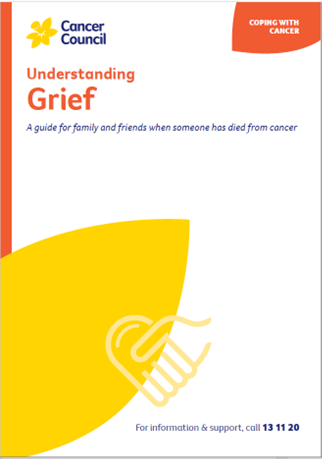- Home
- Cancer Information
- Schools and teachers
- Cancer in the school community
- The bereaved school community
- Helping people who are bereaved
Helping people who are bereaved
If someone in your school community dies, each person’s reaction and grieving process will be unique. Responses to grief depend on the individual’s personality, how close they were to the person who has died, their own experiences with death and their access to support services. Bear in mind that it is normal for someone to feel out of control, overwhelmed or even disbelieving.
Be mindful that the staff who are trying to support grieving students may also be dealing with their own grief and loss. Staff should not feel that they need to hide their grief. It is important for students to see the adults around them modelling a range of healthy grieving processes.
For people who are bereaved, you can:
| Listen | Encourage the bereaved person to talk about the person who has died. If you have a conversation, be attentive and non-judgemental. Allow the person to silently reflect on their loss. Don’t try to talk about other things if they aren’t interested. Let the person cry, act angrily or talk about something else. |
| Find outlets | Explore different ways that the students can express their emotions. Primary students may want to make cards to send to the family, while adolescents may want to be with close friends in a supported setting. With the family’s permission, an online tribute or remembrance page may be a good way for the school community to share memories and send condolences. If it seems appropriate and the family agrees, a school memorial service can also help grieving students, staff and parents. Other options include creating an area of remembrance or raising money for a cancer charity. |
| Show support | If you can, offer support to the family or closest friends. Sending a note of sympathy is a simple but effective gesture. |
| Be patient | Accept that it may take some time for the intense feelings of grief to abate. As time goes on, it can become easier to recognise birthdays and anniversaries, although life has changed forever. |
| Stick to school routines | Some consistency can be helpful for students as long as teachers are flexible about how much schoolwork they can cope with. |
| Teach about cancer | Include discussion of cancer research and treatment in the curriculum where appropriate, particularly if students raise the topic. |
| Seek further support | Bereavement support services may help you or someone you know who is going through a difficult time. |
Understanding grief
Grief is a natural response to losing someone. Depending on their relationship with the person who died, members of the school community may experience a range of emotions, including sadness, numbness, disbelief, loneliness, guilt, anger, relief and acceptance.
People express grief differently. Some people openly display their emotions, while others may show no visible signs of grief. There’s no right or wrong way to grieve or set amount of time it lasts. It is important that people respect each other’s way of grieving. For more information, call Cancer Council 13 11 20 or see Grief and cancer.
→ READ MORE: How young people understand death
Podcast: Coping with Grief
Listen to more episodes from our podcast for people affected by cancer
More resources
Claire Tobin, Principal Medical Advisor, Department of Education and Training, VIC; Dr Antoinette Anazodo, Paediatric and Adolescent Oncologist, Sydney Children’s Hospital and Prince of Wales Hospital, Director of The Sydney Youth Cancer Service, and Conjoint Senior Researcher, University of New South Wales, NSW; Lisa Barrow, Clinical Nurse Educator, Children’s Cancer Centre, Royal Children’s Hospital, Melbourne, VIC; Margo Bulic, Psychosocial Support Worker, CanTeen, ACT; Amber Copeland, 13 11 20 Consultant, Cancer Council Queensland; Donna Drew, Clinical Nurse Consultant, Paediatric Oncology/Palliative Care, Kids Cancer Centre, Sydney Children’s Hospital, Randwick, NSW; Allesha Fecondo, Education Consultant, Victorian Paediatric Rehabilitation Service, and Education Liaison, Ronald McDonald Learning Program, Ronald McDonald House Charities Australia, VIC; John Friedsam, General Manager of Divisions, CanTeen Australia, NSW; Pina Hutcheson, President, Catholic Primary Principals’ Association of WA; Cara Irvine, Year 8 Coordinator, Alfred Deakin High School, ACT; Andrew Long, Assistant Director, Policy and Research, Independent Schools Council of Australia, ACT; Dr Alistair Lum, Post-doctoral Research Fellow – Behavioural Sciences Unit, Sydney Children’s Hospital, University of New South Wales, NSW; Kristine Luszczynski, Learning Program Manager, Quality and Standards, Ronald McDonald House Charities Australia, NSW; Anita Neville, National Manager, Ronald McDonald Learning Program, Ronald McDonald House Charities Australia, VIC; NSW Department of Education, NSW; Mandy Roney, Consumer; Shannon Rush, Primary School Program Manager, Camp Quality, SA; Luke Wade, Education and Career Support Consultant, Redkite, QLD.
View the Cancer Council NSW editorial policy.
View all publications or call 13 11 20 for free printed copies.
Need to talk?
Support services
Coping with a loss from cancer?
Speak to a health professional or to someone who has been there, or find a support group or forum
Work and cancer
Information for employees, employers and workplaces dealing with cancer
Cancer information
What is grief?
Common grief reactions, such as sadness, anger, relief and fear
Workplace fact sheet: Death and bereavement
Information for employers when a staff member dies or is bereaved

